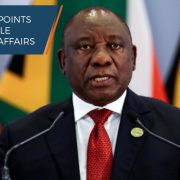Archive for month: November, 2018
Gigaba resigns as Home Affairs Minister
/in Archived, News /by xp-adminThe Presidency has confirmed receiving the letter from the embattled minister.
EWN understands Gigaba wrote in a letter to President Cyril Ramaphosa that he has chosen to place the interests of the African National Congress and the country above his personal interests.
He says the battle he is facing is political in nature, which he shall continue to fight.
Gigaba is, however, cautious to note that his resignation is in no way an admission of guilt and he leaves the public service with a clear conscious, adding that he has done no wrong.
Gigaba’s personal spokesperson was unaware of this development when contacted by EWN for comment, however, the Presidency has confirmed receipt of his letter.
Presidency spokesperson Khusela Diko said: “[We received] A letter of resignation, effective tomorrow, from the Minister of Home Affairs Malusi Gigaba and in the interim Blade Nzimande, who is the minister of transport, has been appointed to act in his space.”
Diko says Ramaphosa has thanked Gigaba for his long-standing service and commitment to government and the people of the country.
Ramaphosa noted that Gigaba says he is stepping down for the sake of the country and the ANC.
The former minister says this will also relieve the president from undue pressure and allow him to focus on running the country.
Gigaba has faced a difficult few weeks – with pressure mounting from opposition parties on him to step down.
Two weeks ago the Constitutional Court rejected his application for leave to appeal a High Court ruling which that found he had lied under oath in the Fireblade Aviation matter.
On 31 October 2018, the Public Protector found that Gigaba violated the Constitution and the executive members’ ethics code when he lied under oath about allowing the Oppenheimers permission to operate a private terminal at OR Tambo International Airport.
Advocate Busisiwe Mkhwebane directed the president to discipline Gigaba for lying in court and that Gigaba also needed to account to Parliament.
A recent selfie video of the minister engaging in a private solo sex act – for which he apologised – has also added to his woes.
Big win for Kenya as South Africa scraps short-term visa requirements
/in Archived, News /by xp-adminKenyan business and academia community travelling to South Africa will now be issued with multiple-entry-visas valid for up to 10 years effective December 1, ending years of strain by Kenyans seeking to travel to SA.
Frequent travellers will also be eligible for 3-year multiple entry visas effective.
South Africa has agreed to ease visa application rules and entry conditions for the above categories following extensive deliberations between Kenya’s Cabinet Secretary for the Ministry of Interior and Coordination of National Government, Dr. Fred Matiang’i, and South Africa’s Home Affairs Minister, Malusi Gigaba, in Pretoria earlier this week.
The agreement reflects the doctrine of reciprocity after Kenya set up a more responsive and straightforward online application process for short-term visas for visitors from all African countries, a move that Kenya’s President Uhuru Kenyatta envisions would foster Pan-African brotherhood and fraternity.
South Africa’s former visa requirements restricted Kenyans to single-entry visas. The latest developments now allow Kenyans to travel to South Africa as often as they want in the next 10 years.
Discussions with South Africa on visa restrictions have been ongoing and have seen both Presidents Uhuru Kenyatta and Cyril Ramaphosa discuss the issue extensively.
Currently, Africans visiting Kenya for a period of less than 30 days do not require Kenyan visas while those intending to stay longer are issued with visas on arrival at the point of entry or through the online e-visa platform.
With Kenya Airways already doing an average of three non-stop flights from the Jomo Kenyatta International Airport (JKIA) to South Africa daily, the new arrangement is expected to enhance people to people contact and unlock the two countries’ tourism and business potential.
South Africa remains a key African tourism market sources for Kenya.
The Kenyan Government’s proposal of issuance of study visas based on the duration of studies and renewal on application when need arises was also granted, a big win for Kenyans pursuing studies in South Africa.
Technical officers from both countries have also been tasked with finding ways of reducing travel restrictions, with a view of completely removing short term (180) days) and transit visa requirements for nationals from the two countries with ordinary passports.
The technical teams have 3 months to complete their assignment.
The two countries have also agreed to step up joint efforts in combating illegal immigration and also protect the integrity of each other’s travel documents.
This move also comes as Kenya’s immigration department steps up efforts to streamline immigration services through automation of immigration services, digitization of immigration records, and the establishment of the e-passport system.
The governments are also in consultation on the strategies to mitigate transnational crimes, especially human trafficking and smuggling emanating from elsewhere in the continent and beyond.
The talks also involved Kenya’s Principal Secretary in the State Department for Immigration, Border Control and Citizen Services, Dr. Gordon Kihalangwa, Kenya’s High Commisioner to South Africa, Amb. Jean Kamau and the Ministry of Interior and Coordination of National Government.
Under the new terms, Visa to South Africa may also be granted for visits to family, friends, tourism, business and spouses joining their partners working or studying in South Africa.
Children will also be allowed to join parents who are in South Africa on work or study visa.
Source: The Exchange
Attracting and Retaining Critical Skills
/in Archived, News /by xp-adminSKILLS SHORTAGES
South Africa is faced with a shortage of skills across a number of sectors. The Critical Skills list published by the Department of Home Affairs was introduced in 2014 (the updated list is expected to be released in April 2019), identifying the sectors and specific occupations plagued with these shortages thereby providing business with the ability to source these skills globally ensuring continued economic growth.
SKILLS TRANSFER – HOW?
Mr Phindiwe Mbhele, Director of the Department of Home Affairs’ Corporate Accounts Unit, indicated that in many cases the source of the challenges faced in transferring of skills may not be the ability, but rather the method. This is especially apparent in occupations such as CEO and other executive roles where the skill set is diverse and hard to quantify.
Deputy Director of Labour Migration at Department of Labour, Ms Nonhlanhla Ngwenya, further referred to the ‘Employment Services Act’ promulgated in 2014, that will introduce training processes for South African companies to better enable them to conduct the necessary upskilling of local talent through skills transfer programs.
CONCESSION PLANNING
Ms Monyela, whom has experience as an expat herself, advocated the importance of expatriate employees and especially at strategic and executive level. Philafrica being a multi-national organisation with plans to expand further across Africa, Ms Monyela appreciates that expatriates are necessary for the growth of the organisation but requires strategy to ensure skills transfer and concession planning. The skills transfer is further required both locally and abroad to ensure holistic development of the business.
She caveats, it is about finding the balance between bringing foreign talent into South Africa and sending skilled local employees abroad with the clear intention that, in both instances, skills are going to be utilized fully and transferred for the prescribed purpose and period that they have been assigned.
As an HR executive, Ms Monyela encouraged any HR professional to understand the landscape in which the desired skills of foreign employees ought to be deployed.
ENGAGE
Once the company has determined the set of skills they require, they need to familiarise themselves in terms of the various processes involved when employing a foreign national.
This will include engaging both an Immigration Service Provider and the Department of Home Affairs to determine the correct and most feasible methods to proceed in employing a foreign national.
Mr Moeketsi Seboko, Immigration and Technical Manager at Xpatweb, indicated that he is often approached by organizations and professionals after an application for a visa has been rejected, only to find, that numerous errors and incorrect processes were followed in applying for the visa. This naturally incurs unforeseen delays with the project where the expat is required to be onsite within a prescribed timeframe and causes frustration for the employer.
At the on-set, it is imperative to determine and qualify a foreign employee correctly within a prescribed visa category as per the Immigration Act of 2002, as amended. This will avoid unnecessary delays and complications. It is best to approach a professional whom has gleaned knowledge in terms of processes and requirements for foreign employees.
In most cases, rejections could have been prevented if prior engagement with the Department of Home Affairs had occurred. Mr Mbhele welcomes any Corporate to approach the Department of Home Affairs prior to the implementation of a project and to gain the support of the Department and determine exact requirements and protocols specific to the project.
In closing
The onus is therefore on employers to ensure that the South African labour market is upskilled by the foreign employees within the respective organisations. If further able, to retain these skills to ensure continued input into the South African economy.
Panel members
- The Issuing Authority – Mr Phindiwe Mbhele, Director of the Department of Home Affairs’ Corporate Accounts Unit;
- The Deciding Authority – Ms Nonhlanhla Ngwenya, Deputy Director of Labour Migration at Department of Labour;
- A South African Employer – Ms Mpume Monyela, HR Director at Philafrica Foods (Pty) Ltd; and
- Immigration Service Provider – Moeketsi Seboko, Immigration and Technical Manager at Xpatweb.
FIND US
Johannesburg
17 Eaton Avenue,
Bryanston, Johannesburg,
Gauteng, 2191
South Africa
George
55 York Street
Dormehls Drift
George, 6529
South Africa
CONTACT US
Telephone:
South Africa: 011 467 0810
Postal:
PO BOX 35046
Northcliff
2115
IN THE NEWS
- Another Positive Move To Attract More Tourists To SA
- Bringing in the Bomb Squad at Home Affairs
- How Home Affairs’ Immigration Reforms Could Drive SA’s Growth in 2025
- Phindiwe Mbhele on Remote Work Visa: Splendid Cape Town is wooing more and more digital nomads
- Cape Town Shines, and So Does South Africa’s New Critical Skills Visa Overhaul




